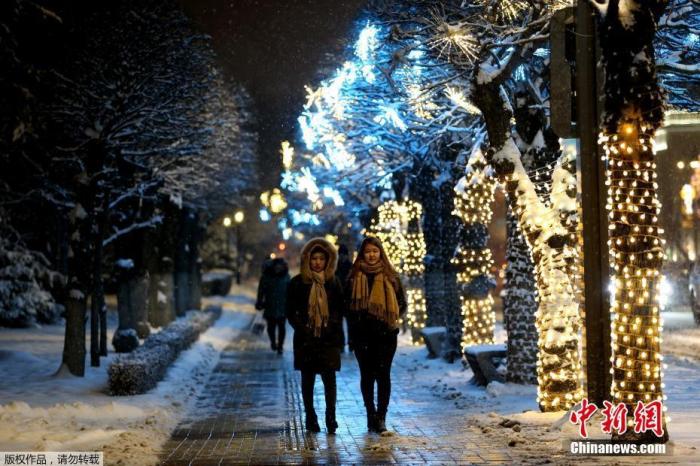(Fighting New Coronary Pneumonia) Global War Epidemic: How to break through the "locomotive" of the European economy for the first time in the cumulative number of confirmed cases?
China News Agency, Berlin, November 27 (Reporter Peng Dawei) Ten months after the first case of new coronavirus infection in China was confirmed on January 27, the cumulative number of confirmed cases announced by the German disease control agency on November 27 exceeded 1 million for the first time .
Although the second round of "closing the city" has been nearly a month, the epidemic situation in Germany is still very serious.
The Minister of the German Federal Chancellery Braun recently stated that the government intends to continue to "close the city" until early next year.
The picture shows on the afternoon of November 16, a sign reminding people to wear masks when entering the station was posted at the entrance of the Berlin Main Railway Station.
Photo by China News Agency reporter Peng Dawei
As the EU's largest country in terms of economic output and population, Germany was the first country to emerge from recession during the 2008-2009 global financial crisis and was "outstanding" among EU countries.
Professor Helfried Minkler, a political scientist at Humboldt University in Berlin, described Germany as "an anchoring force to avoid splitting Europe or the failure of the euro."
However, for the German economy, the new crown epidemic that broke out at the beginning of this year has brought more severe challenges.
German Chancellor Merkel said that this is the biggest challenge Germany has faced since the end of World War II.
From the data point of view, Germany's first round of nationwide "cities closure" measures implemented between March and June led to a cliff-like decline in the economy, and the gross domestic product (GDP) in the second quarter fell by 9.8% from the previous month.
With the gradual "unblocking" from June and the easing of the epidemic in the summer, Germany's economy has recovered significantly, and GDP in the third quarter rose 8.5% from the previous quarter.
However, the GDP in the third quarter fell by 4% compared with the same period last year.
After the fall, with the second wave of epidemic outbreaks and the intensity far exceeding the first wave at the beginning of the year, Germany once again implemented the nationwide "cities closure" measures.
The ifo German Business Climate Index, which reflects the expectations of the German business community for the future, has fallen for two consecutive months.
Experts said this reflects that the second wave of the epidemic interrupted the process of German economic recovery.
The analysis believes that Germany's strong export-oriented manufacturing industry and strict disciplined and prudent fiscal policy were the key factors that enabled it to take the lead in recovery and lead Europe out of the debt crisis.
However, the two "magic weapons" are now being severely challenged.
The Christmas decorations in Bremen, Germany are beautiful.
The Ifo Economic Research Institute in Munich pointed out that Germany, as an export-oriented economy, is particularly affected by the development of the current global epidemic: Due to Germany's high integration into the global value chain, its economy has been more severely impacted by the epidemic than other countries. .
The German Manufacturing Export Confidence Index compiled by the institute showed that the confidence of German export companies dropped significantly in November, and the manufacturing confidence index plummeted from 7.0 last month to minus 2.1.
Affected by the raging second wave of the epidemic in many European countries, the auto industry's optimism in the past few months has turned into pessimism.
In terms of fiscal policy, Schaeuble, who has served as the German Finance Minister for a long time, is known for his “Schwarzer Null” policy for short, which is to pursue a “zero deficit” state in which the national budget is balanced or surplus.
However, its successor and current Finance Minister Schultz had to abandon the country's “black zero” policy that has been persisting for many years and is unique in Europe under the epidemic situation.
Since the beginning of this year, the German government has not only provided hundreds of billions of euros in bail-out funds to make up for the losses suffered by companies and individuals during the epidemic, but it has also abandoned its long-standing “opposing joint borrowing” stance and turned to join hands with France. Advocate for a 500 billion euro EU recovery fund.
On the 27th, Germany’s ruling Coalition Party and the Social Democratic Party reached an agreement on next year’s federal budget, which will add nearly 180 billion euros in debt and significantly increase investment in health care, transportation and infrastructure.
“From an international perspective, Germany’s response to the first wave of the epidemic so far has been relatively successful—whether in terms of epidemic prevention or maintenance of the real economy and financial operations.” Sebastian Senior Economist at Deutsche Bank Baker pointed out to reporters that the rescue measures launched by the German government for large companies and their employees in the country have played a key role in avoiding economic collapse. However, the government's rescue policy has a role for individual owners, freelancers and small businesses. Relatively limited.
In the next step, the German economic community puts hope on the vaccine that is expected to start in mid-December.
A few days ago, the final effective rate of the new crown vaccine phase III trial jointly developed by BioNTech of Germany and Pfizer of the United States has reached 95%.
At present, vaccination centers in all parts of Germany are under construction, and vaccination can be started only after the European Union approves the vaccine.
"An effective vaccine with low side effects will change everything." said Felbermeier, director of the Kiel Institute of World Economics. As long as high-risk groups are effectively protected, consumer activities in many areas such as culture, entertainment, restaurants, hotels, etc. It can return to normal in summer.
(Finish)

